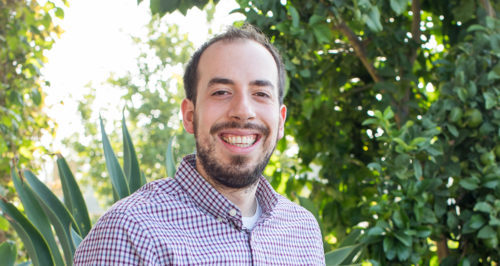Brian Shuve Named Cottrell Scholar
March 1, 2021
Harvey Mudd physics professor Brian Shuve has been named a 2021 Cottrell Scholar, an award given each year to 25 outstanding teacher-scholars in chemistry, physics and astronomy by the Research Corporation for Science Advancement.
Cottrell scholars receive $100,000 and join a group of educators and researchers focused on innovative teaching in the sciences.
“I’m of course excited for the financial support, which will be used to support student summer research, conference travel and computing resources,” says Shuve, a faculty member since 2016, “but I’m also excited to join the community of Cottrell scholars and exchange ideas for improving my teaching and integrating my scholarship more into what I teach.”
Shuve will use the grant to support two projects: one in his research field of particle physics and the other in physics education.
Particle physics research
The research project, titled “Matter-Antimatter Asymmetry from Dark Matter Freeze-In,” seeks to address two seemingly unrelated problems in physics within a common framework. The first problem is the nature of “dark matter,” which comprises 80% of the matter in the universe but does not give off light and is not made of any of the known particles. The second is “matter-antimatter asymmetry”: how regular types of matter (protons, neutrons, electrons) have corresponding anti-particles (anti-protons, anti-neutrons, positrons), and yet everything on earth is made exclusively out of matter and not antimatter. Since it is believed that equal quantities of matter and antimatter were created in the Big Bang, physicists do not yet know why we ended up with more matter than antimatter.
The project proposal was based on a new idea that Shuve developed with David Tucker-Smith at Williams College, in which the production and scattering of dark matter shortly after the Big Bang has a back-reaction effect that can generate an excess of matter over antimatter and hence explains why humans are made of particles and not anti-particles. Shuve identified a number of new theoretical and experimental studies that will provide a more complete picture of how scientists can test theories of dark matter and the matter-antimatter asymmetry.
“This new idea could solve a number of important, unanswered questions in physics but is only minimally explored from a theoretical perspective,” says Shuve. “The work partially grew out of related projects on which I have been collaborating with Harvey Mudd students, who have shown that undergraduates can contribute substantially to analytic and numerical studies of how these theories play out in a cosmological setting.”
Physics education
The physics education project that the grant supports was inspired by Shuve’s four years teaching Physics 111: Theoretical Mechanics, a required class for junior physics majors. The class represents a substantial leap in abstraction and mathematical complexity of physics and uses powerful new methods to examine difficult problems in mechanics. Because the level of abstraction of the material makes it difficult for students to integrate what they are learning into their existing knowledge base, Shuve intends to develop new interactive applets. Students will be able to visualize and manipulate the mathematical objects underpinning theoretical mechanics as they are applied to familiar physical problems (like springs and gravity).
“These applets will allow students to play around with the new abstract tools and see how they connect with more familiar concepts like forces and accelerations,” says Shuve. “Such applets exist for lower-division physics classes, but not typically for advanced major courses. They will be an important addition to the physics pedagogy toolkit, both at Mudd and other institutions.”
See the full list of 2021 Cottrell Scholars
